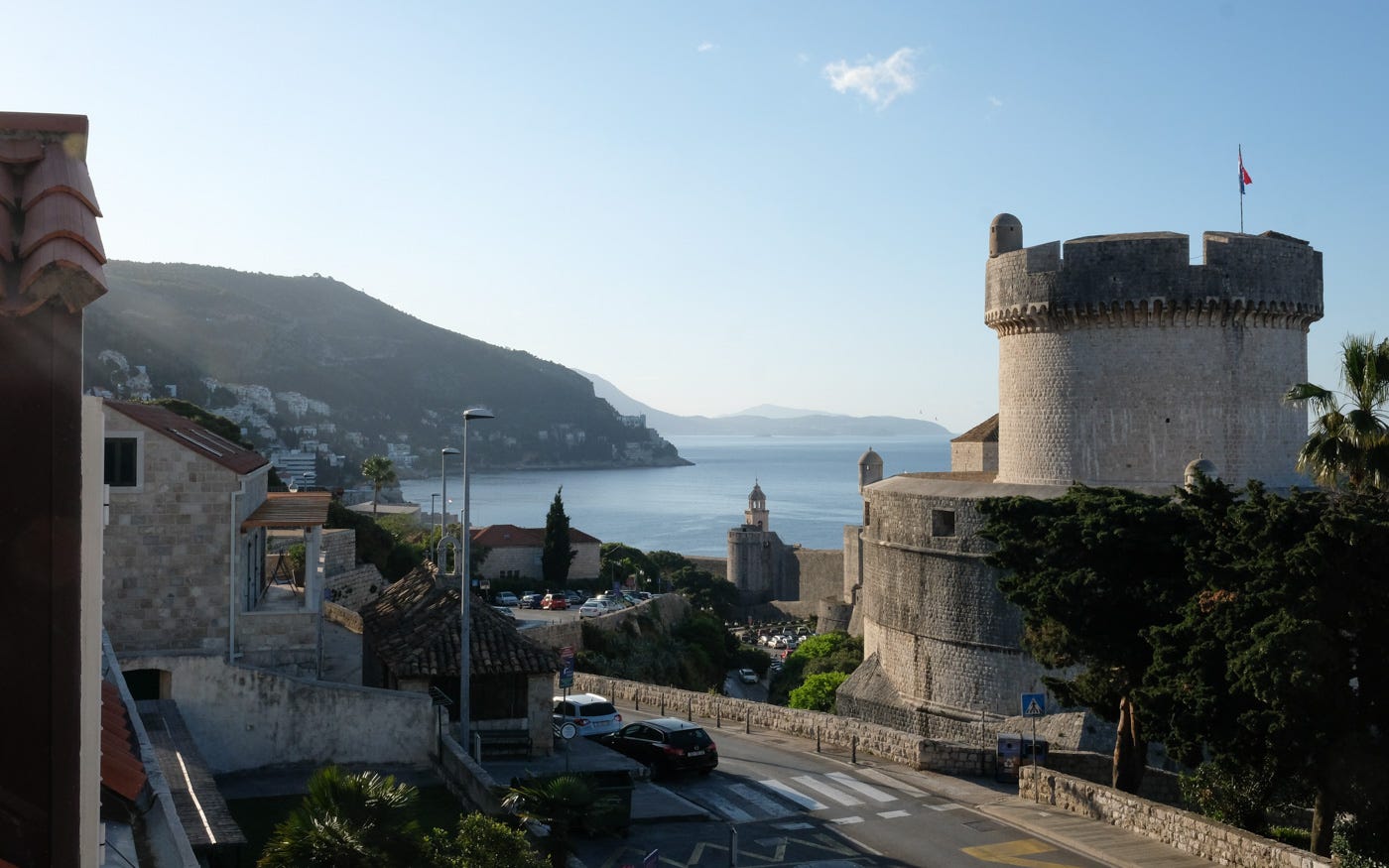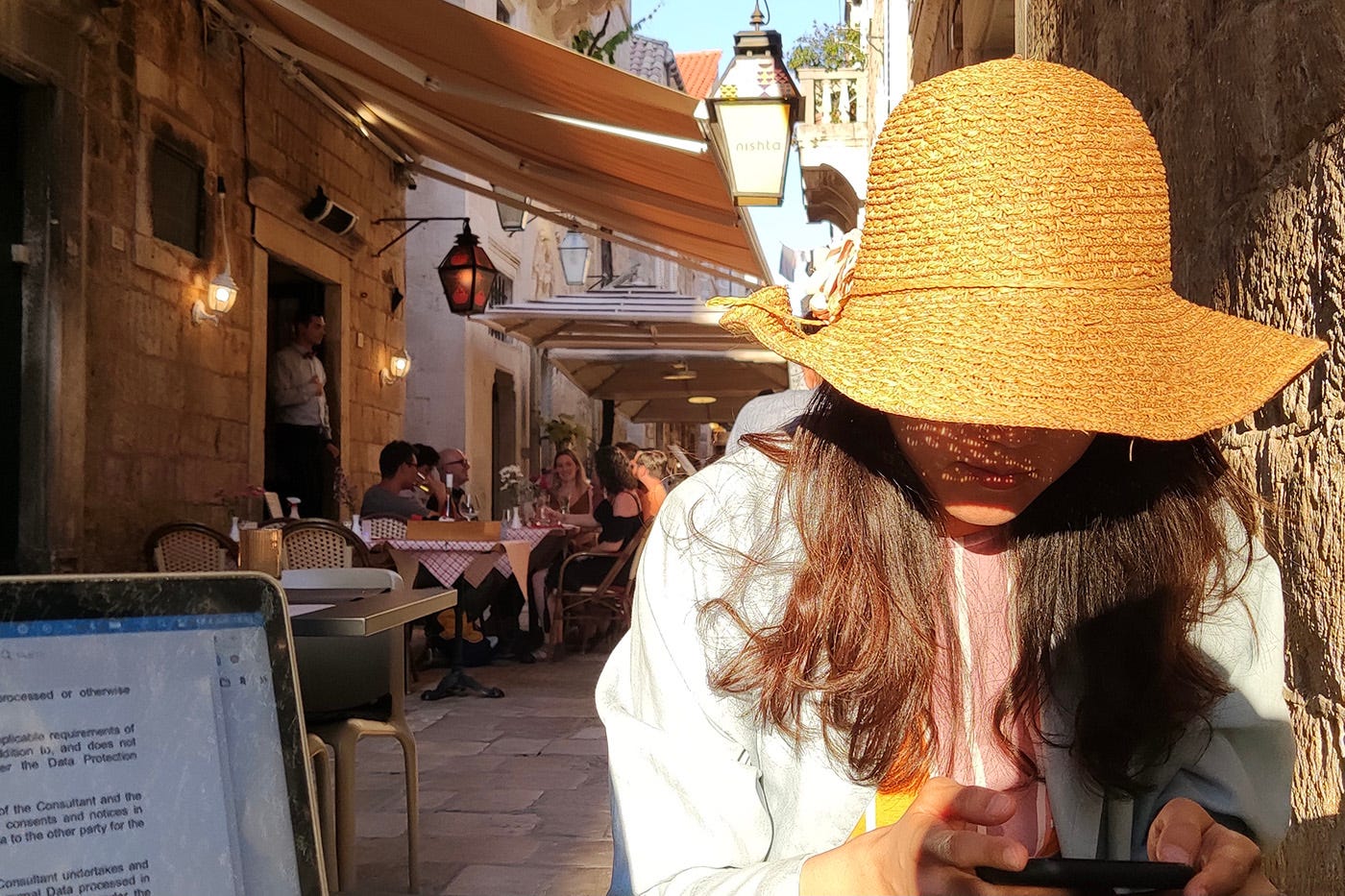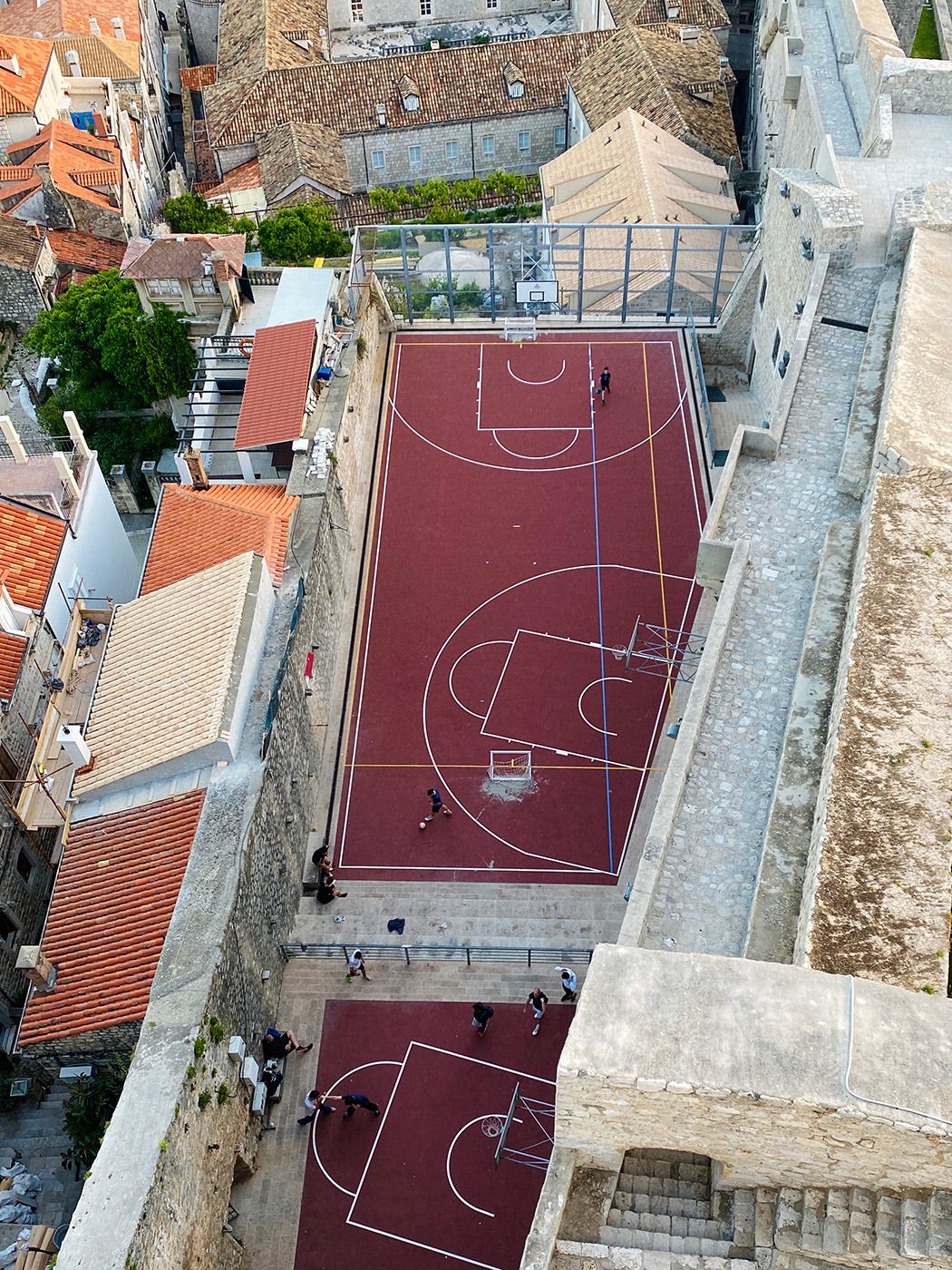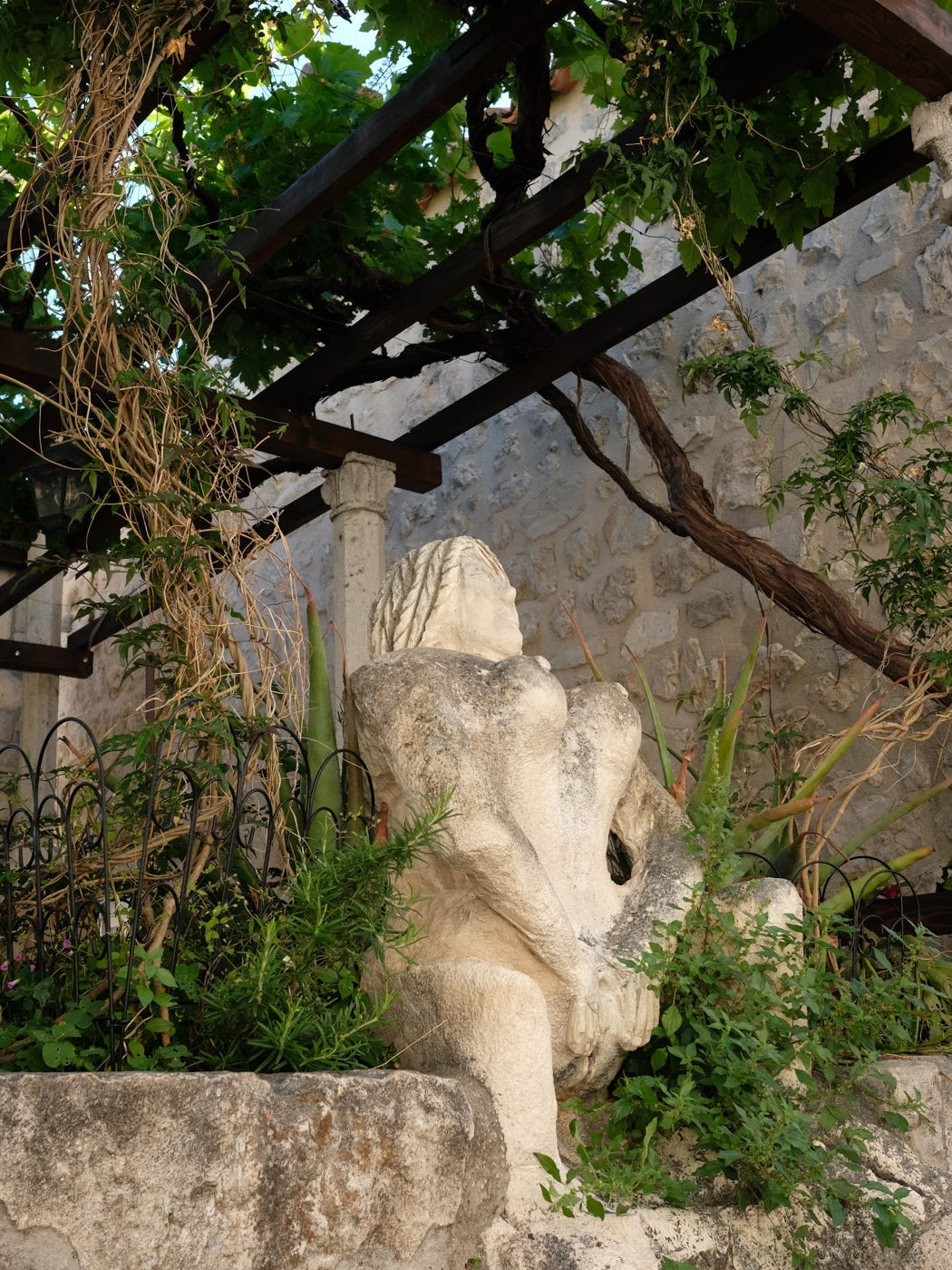From an old city by the sea #1
Studies in minor details: Feeling fragmented, I try to find my moorings in everyday rituals and the ordinary in the extraordinary.
I’m safe, and well, sheltering amid this ongoing pandemic in the company of W.C.—as in the Willing Companion, haha—after being separated for a year amid restrictions on travel and the suspension of longer-term visa applications.
As some of you might have guessed from the photo, we’re in Dubrovnik. I know it’s hard to believe—seriously, the Adriatic?—but coming here honestly wasn’t, at first, an entirely enthusiastic decision on my part. I was torn between warring wants and needs that only different places could satisfy. Hoping to do some writing or reporting while away, I thought Dubrovnik might feel like too much of a tourist bubble in the summer season, even amid a pandemic, to live in for more than a week. For extended stays I usually prefer a metropolis of some kind, where people’s stories feel more readily discoverable, with different communities being more enmeshed in each other’s lives, trying to reconcile each other’s wants and needs. But in these times, a big city’s density of population would be limiting were a lockdown imposed, and we thought it best to go somewhere with ample open spaces where we could safely social distance. Croatia is also one of the few countries that W.C. and I, being of different nationalities, could both enter—with a negative coronavirus test—that we also agreed on. Now that I’m here, I realize what an immense gift it is to be here, especially at a time when the usual crowds are so significantly reduced. We really are, to paraphrase Cheryl Strayed, putting ourselves in the way of beauty.
Still, I’ve had a difficult time being present. Someone, somewhere (I can’t recall now) recently pointed out that, where we used to be able to change our outlook on the world by simply changing where we physically are, it’s now impossible for us to do so because the only place where we truly reside is online. This feels deeply true for me, and I’ve been re-evaluating my use of social media—how it affects one’s mental landscape, how it takes you out of your current place and time depending on the community you’ve predominantly oriented your feeds to. Naturally, mine are inclined heavily toward Malaysia, which is going through its third lockdown and its gravest period this pandemic, having surpassed India in the number of infections per million people. And as I’ve followed more journalists in Myanmar to keep up with the crisis there, it’s become harder and harder to reconcile the contrast in human experiences in different places when you can see it all—calm and chaos and joy and tragedy—unfolding simultaneously from your online perch, and harder and harder to care about something in an effective way when you feel you should care about everything. In Machines Like Me, Ian McEwan noted how the act of consuming the news can often be counterproductive: “Reading this material was a way of not contemplating the event itself. I blanked the screen and sat for a while, thinking of nothing much. It was as though I was waiting for the next event, the decent one, that would undo the event before.” As someone who also writes about—or rather, around—the news, this can feel dispiriting.
Being away from home, I also feel a little guilty about the stories I’m not witnessing in person. People my age were recently able to opt in (for a time, not anymore) for the Astra Zeneca vaccine in Malaysia before it was officially our turn; at the same time, I’m not sure how far on-the-ground reporting would be feasible anyway considering the spike in infections and the reimposition of a strict lockdown. Sure, some stories can be—has to be, in this pandemic—done remotely, and I’m working on them, but the constant hum of anxiety in my brain tells me I’m never doing enough. I schedule calls with sources in Malaysia to suss out potential longer-term projects I can dive back into when I’m home, continue to learn German and research a few stories in Germany I might want to look into when I’m back there. I’m already trying to prepare for what happens after Croatia, while trying to complete several due stories that have nothing to do with Croatia. In a way, it feels as if I’m trying to bookend this time in Dubrovnik as a blip on my radar, a time-out without consequence, instead of engaging with it fully. Physically, I’m here; but mentally, I’m often elsewhere—not just in place but also in time, simultaneously languishing in the past and racing towards the future. In a text to a friend, I wrote, “Happy to be here but feeling a little fragmented. Hoping to make the best of it.”
So maybe I’ll manage to pitch a story on Dubrovnik to better immerse myself here. But also, I thought: Why don’t I just do something myself? Doesn’t this newsletter exist for this very reason? That’s when I decided to write a series of essays during my time here—once a week all this month, beginning with this. There’s no pressure, I tell myself. Each letter could be as short as five hundred words, if that were all I had. It wouldn’t even have to rally around a coherent theme. The point would just be to observe my immediate surroundings—pay attention to the small delights—in order to root myself deeper in it. I’m just trying to make myself remember: there’s a time and place for everything.
So, here goes. The first.
Finding our moorings in everyday rituals
The suspense, partly mitigated by Adam’s reasoning, and thinly spread across the days, then even more sparsely across the weeks, heightened our appreciation of the daily round. Mere ordinariness became a comfort. The dullest of food, a slice of toast, offered in its lingering warmth a promise of everyday life – we would come through. Cleaning up a kitchen, a task we no longer left to Adam alone, affirmed our hold on the future. Reading a newspaper over a cup of coffee was an act of defiance. There was something comic or absurd, to be sprawled in an armchair reading about the riots in nearby Brixton or Mrs Thatcher’s heroic endeavours to structure the European Single Market, then glancing up to wonder if that was a rapist and would-be murdered at the door. Naturally, the threat bound us closely, even as we believed in it less.
—Ian McEwan, Machines Like Me

We’ve been here a month now, and beyond paying a surprisingly hefty entrance fee to walk the old town’s walls (which, lamentably, you can only do once with each ticket) and engaging a tour guide for a historical walking tour, we’ve not done very much by way of conventional travel. I guess the fact that we didn’t come here primarily to travel, and knowing we have some more time ahead here, has made us more relaxed about ticking off our to-do list of sights and experiences, and I half worry—half seriously—that we’ll leave regretting we haven’t explored enough. You put off doing tourist things long enough and you might never end up doing them. I spent my university years in England and I can’t remember ever having been on the London Eye. I have never been to Oxford or the Cotswolds.
To be fair, it’s not my first time in Dubrovnik. Years ago, I came here with a group of university friends—I think we were nine in total!—for all of, I think, two nights, before Game of Thrones was ever filmed in Dubrovnik. And to be honest, I don’t remember all that much of the city (not without old photographs to jog my memory), though I did slip into a few deja vu moments now strolling in and around the old town. I remember us splashing around with a volleyball on a crowded pebble beach, straddling a canon for a cheesy photo op overlooking the old port, and just strolling through Stradun—the broad, light-filled boulevard that paves the way in through Pile Gate. Otherwise, I’m really seeing Dubrovnik anew. And what has helped me do that, especially, is the routine W.C. and I have grown into as the days roll on.
Many days we tinker all night—W.C., conceptualizing imaginary worlds; me, writing and researching and pitching or trying to do all three, sometimes taking Zoom calls at 3 a.m. to catch other time zones. We’re both freelancers, but he is better at compartmentalizing and has a healthier relationship to work, and really has been an immense support to me in recalibrating my relationship with “productivity”. I mean, I’m somewhat self-aware and know what needs to be done, I just have yet to do it!
When the day starts to break (around 4:40 a.m. these days), after the garbage truck has come to collect with its familiar beeping, we throw open the kitchen windows of our attic apartment, perched just outside the old town, to watch the slow warming of the sky. W.C. insists we do this every day, in part to coax me out of whatever mind maze I’ve lost myself in. He has a painter’s eye that catches the tiniest differences from day to day, and often records himself describing the scene before him for better painting reference later because the camera is incapable of picking up the subtleties. For a few moments, we let the cool breeze waft over our faces before crawling into bed, leaving the bedroom shutters angled open so that the afternoon sun’s rays would induce us to wake up when our alarms ring.
Seven hours later—or sometimes just three or four, if a scheduled call or deadline beckons—we wake up and throw open all the windows again, letting the airflow through the rooms. We put a Moka pot on the stove, waiting for its comforting gurgle. It’s a routine we’ve grown into in Berlin, and luckily this apartment came with one, since we didn’t bring our own. As the smell of freshly brewed coffee fills the kitchen, we make bowls of rolled oats with berries and bananas, or slices of rustic bread from the local bakery toasted in a sandwich grill, topped with margarine and rucola leaves or ajvar, a red pepper spread. Sometimes we warm up rice or pasta leftovers from the night before. When our tummies are warm and full, we check our phones and emails and social media for anything urgent that needs to be dealt with. And if the rest of the world can wait, we pack our day bags, lather on sunblock, and head outside with our hats.
Apart from a few cloudy days, we’ve had beautiful weather. A month ago it hovered closer to 20 degrees Celsius; these days, it’s closer to 25. Sometimes we’ll try to make something more of an afternoon and head someplace new outside the old town—winding northwest through parks and cliffside trails and sunkissed streets towards the neighborhoods of Lapad and Babin Kuk. But most of our present days revolve around work, with new commissions and personal projects we stubbornly cling to, so we haven’t ventured too far from our apartment yet. To strike some kind of middle ground, we search for a cafe with a view to settle into, crowding a small table with our working apparatus.
Cafes started re-opening here in mid-April, though still in small numbers, and only for outdoor dining, mandated to close at 10 p.m. Many of them were offering a thirty percent discount to lure in patrons, since there were so few. Now, as more people mill in every day, most businesses have opened up (even for indoor dining, though we’ll continue to avoid that), and business hours have stretched to 11 p.m. or midnight on weekends. Lamentably, we can no longer count on discounts in some places—what a difference they make! Still, just being able to sit out in a cafe and while the time away again feels like a novel pleasure. I don’t know how long it will last, if the tourists will come again this year. For the sake of the tourism industry’s workers (who are, at least, prioritized for vaccination), I hope they do, though perhaps not in the same force that led some residents to protest the city’s overtourism in 2017. It’s all the more reason to be grateful for our season here, and to savor it.
But even as we aren’t exploring at full steam yet, we try to sprinkle in a little variation to our days. We try to take a different route into the old town sometimes, down several flights of steps through Pile Gate, or down a languorous slope through Ploce Gate that overlooks the old harbour. On days when the anxiety doesn’t cramp my brain as hard, we let ourselves linger at new things we notice along the way, and let our feet follow our gaze to the next thing, and the next. An especially picturesque doorway framed by crawling grapevines. A small gap in the walls leading to a wind-struck bar clinging to the side of a steep cliff. An irregularly shaped basketball court built into a plateau just below Minceta fort tower, the old town’s highest point. A statue of a woman, tits up, strategically obscured by weeds and bushes, touching herself…?
Anyway, we must have seen all of the old town by now, but I’m convinced there must still be a skinny side street we haven’t been down, a zig and a zag away, where the light shines differently. Suddenly, because we have focused our attention more narrowly, delineated our own map that gives shape to our every day, I feel the need to cover every inch of it. Because it’s possible. Because suddenly, it’s a scale you can feel and visualize and understand. A big city can overwhelm you with its unknowability. A small city at least presents the illusion that it can be known.
Traveling with W.C., I’m reminded of how much more spontaneous he is than I am. Or rather, that I’m less spontaneous than I think I am. Or maybe that I just used to be more spontaneous. He’s more willing to take a detour when he sees something that piques his curiosity, whereas I might file it away mentally for another time when I have a chunk of time to spare, and then really detour properly. In the same way, I often feel like I need a substantial stretch of hyper-focused time ahead to harness my full mental capacity to write; otherwise, I’d just busy myself with all the other tasks that surround writing. But there is almost never a perfect time for anything, I know that. I should just write when the window of opportunity arises. But the idea of a well-balanced day—say, a couple of hours swimming or hiking followed by sustained intellectual labor, plus all the usual things we have to do (cooking really does take up time!)—eludes me. It suits my natural constitution better to spend, say, five whole days working almost to the exclusion of all else and then take two whole days off. But as a freelancer it never feels like there’s a clear break, so sometimes those two whole days get pushed back, and pushed back again. It hasn’t been unheard of for me to go weeks hunched over my desk, without seeing anyone socially.
Admittedly, dwelling in cafes isn’t always productive. Sometimes I get distracted watching people. Sometimes it gets too windy. Sometimes the table for two we’ve chosen is too cramped. But the view outside our window every morning, or afternoon, is always so beautiful that I honestly feel like I’m making a bad decision every time I choose to stay indoors. We’ve already found a couple of favorite spots, but we still try to find new ones—for the different vantage points they afford W.C. for painting (with interesting shapes of light and shadow), or, for me, the way they’re tucked or nestled somewhere (into a concave of wall, or an overhang of leaves). Then we’ll have our second coffee of the day, maybe a bread basket with a bowl of mashed potatoes and Swiss chard glistening with generous slugs of olive oil, and dive into our practice. I guess that’s a better word to encompass the entirety of what we try to do—including the preparations that go into the final result, the upskilling and searching for applicable new perspectives, that hardly get recognised or renumerated in the course of “work”.
Later, as the sky gloams over, we either eat out or head to the grocer’s before it closes to buy what we need to cook at home. On the walk back to our apartment, we sometimes take another little detour. But more often, we leave via Pile Gate and duck quickly below its arch to avoid the plump pigeons already huddled to sleep on the medieval wall rings. I think, surely, by the time we leave—just statistically, considering how many pigeons congregate here—we must get pooped on at least once? (As it turned out, at the time of making my final edits on this letter, W.C. was anointed, in several places, by the swallows circling above us in an open cafe, haha!) We pass the same lanky busker slouching against the wall, strumming flamenco on his guitar, and realize that we’ve forgotten, yet again, to get change ready for him. (We finally did.) Then, out of the gate, we climb up the same two hundred or so steps to get back to our temporary home.
Back indoors, we disinfect our hands, our phones, and the groceries, and start cooking together—which, too, has become something almost liturgical, from having to do it so often already. I chop the garlic and mushrooms and veggies, while W.C. slices the onion (it hurts my eyes more) and starts the boiling or stir-frying. We still disagree sometimes on whether to mix the veggies with the rice, on whether to cook them separately, on which veggies to throw in first, on how much water to put into something. W.C. quite likes everything in a big stew; I generally like my carbohydrates separate from the accompaniments—so I can just serve myself portions of what I want, so the taste of each ingredient is still discernible from the whole. I realize again how intimately we all hold on to the respective ways we’ve grown up eating and cooking, and it’s been a lesson in giving and taking. Or, we just take turns doing it the way either of us prefers, ha.
Finally, we huddle down to eat our dinner while watching YouTube videos or segments of a stand-up special, sometimes a movie. Sometimes we read passages from a book out loud to each other—we’re still stuck on Hemingway’s Our Man in Havana—or play Nintendo Super Mario, which W.C. managed to get working on my laptop, though jabbing at the keyboard instead of a joystick means I play clumsily. (Normally, we would also carve out time for Scrabble—ongoing games between other things that never end—but we wanted to travel with minimal fuss and hadn’t brought our set with us.) Then, after the break, we go back to tinkering again on our respective obsessions before bed.
I wonder how much this pandemic will change how people travel. Already, some countries including Croatia have made visa allowances for longer-term travel, slow travel—though I don’t love the term “digital nomad” (maybe because of the already bad rep it’s garnered, especially in Bali) and can’t imagine anyone actually calling themselves that, and there are challenges yet to be fully explored—psychological fragmentation, for one—that come hand in hand with living between countries. Despite that, this is probably how I most like to explore the world: staying put in an unfamiliar place for a while, really taking the time to move through, soaking in its daily scenes and vibes. Basically, to approximate living rather than traveling, but with the fresh gaze of a curious outsider, questioning everything.
But there’s a balance to be made so that one doesn’t take time for granted; and deadlines permitting, we’ll have to take some time out to actively explore in the coming weeks. With more and more people streaming into Dubrovnik every day, it would be best for us to do some roaming now, especially since neither of us is vaccinated yet—though I did hear about nearby Serbia offering tourists jabs a while ago (before we came, not anymore). I’m not in the most carefree travel mindset now, but I don’t want to squander the opportunity of being here either. I don’t want to leave feeling like I haven’t made the most of my time here. There are other neighborhoods to see, islands to explore, hidden perches in limestone cliffs from which to contemplate the world.
I still can’t quite believe that this place is our normal for a little while. And I’m genuinely appreciating the ritualistic minutiae that make up our days, that steady us in a world gone temporarily—is that too optimistic?—awry.
Writing this, I’m reminded of another passage from Ian McEwan’s novel:
These twenty-five artificial men and women released into the world are not thriving. We may be confronting a boundary condition, a limitation we’ve imposed upon ourselves. We create a machine with intelligence and self-awareness and push it out into our imperfect world. Devised along generally rational lines, well disposed to others, such a mind soon finds itself in a hurricane of contradictions. We’ve lived with them and the list wearies us. Millions dying of diseases we know how to cure. Millions living in poverty when there’s enough to go around. We degrade the biosphere when we know it’s our only home. We threaten each other with nuclear weapons when we know where it could lead. We love living things but we permit a mass extinction of species. And all the rest – genocide, torture, enslavement, domestic murder, child abuse, school shootings, rape and scores of daily outrages. We live alongside this torment and aren’t amazed when we still find happiness, even love. Artificial minds are not so well defended.
Yours,
E.












